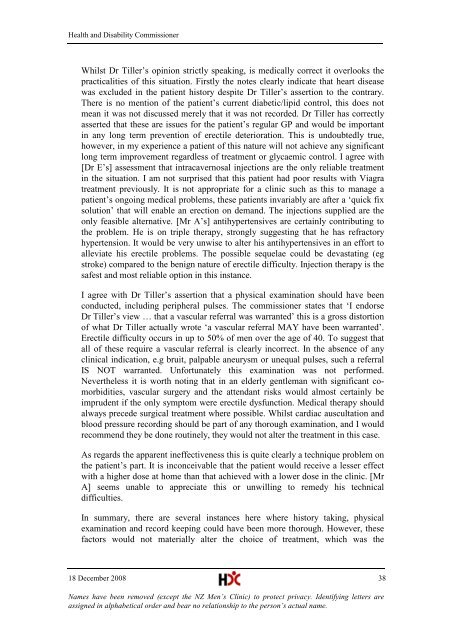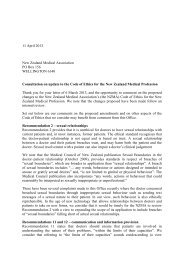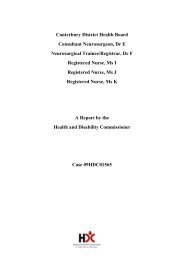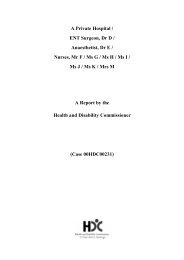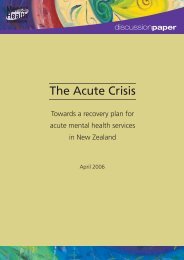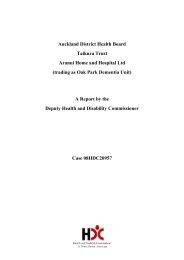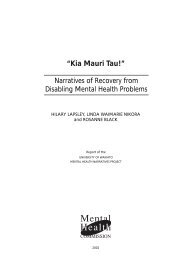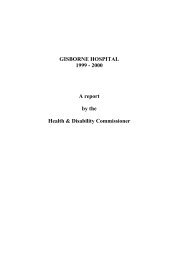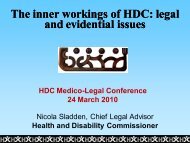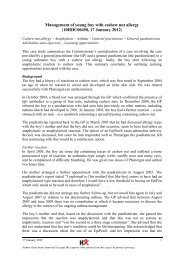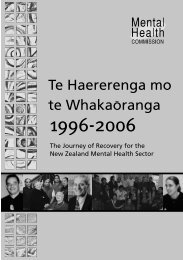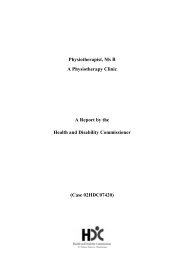Medical Practitioner, Dr E New Zealand Men's Clinic - Health and ...
Medical Practitioner, Dr E New Zealand Men's Clinic - Health and ...
Medical Practitioner, Dr E New Zealand Men's Clinic - Health and ...
You also want an ePaper? Increase the reach of your titles
YUMPU automatically turns print PDFs into web optimized ePapers that Google loves.
<strong>Health</strong> <strong>and</strong> Disability Commissioner<br />
Whilst <strong>Dr</strong> Tiller’s opinion strictly speaking, is medically correct it overlooks the<br />
practicalities of this situation. Firstly the notes clearly indicate that heart disease<br />
was excluded in the patient history despite <strong>Dr</strong> Tiller’s assertion to the contrary.<br />
There is no mention of the patient’s current diabetic/lipid control, this does not<br />
mean it was not discussed merely that it was not recorded. <strong>Dr</strong> Tiller has correctly<br />
asserted that these are issues for the patient’s regular GP <strong>and</strong> would be important<br />
in any long term prevention of erectile deterioration. This is undoubtedly true,<br />
however, in my experience a patient of this nature will not achieve any significant<br />
long term improvement regardless of treatment or glycaemic control. I agree with<br />
[<strong>Dr</strong> E’s] assessment that intracavernosal injections are the only reliable treatment<br />
in the situation. I am not surprised that this patient had poor results with Viagra<br />
treatment previously. It is not appropriate for a clinic such as this to manage a<br />
patient’s ongoing medical problems, these patients invariably are after a ‘quick fix<br />
solution’ that will enable an erection on dem<strong>and</strong>. The injections supplied are the<br />
only feasible alternative. [Mr A’s] antihypertensives are certainly contributing to<br />
the problem. He is on triple therapy, strongly suggesting that he has refractory<br />
hypertension. It would be very unwise to alter his antihypertensives in an effort to<br />
alleviate his erectile problems. The possible sequelae could be devastating (eg<br />
stroke) compared to the benign nature of erectile difficulty. Injection therapy is the<br />
safest <strong>and</strong> most reliable option in this instance.<br />
I agree with <strong>Dr</strong> Tiller’s assertion that a physical examination should have been<br />
conducted, including peripheral pulses. The commissioner states that ‘I endorse<br />
<strong>Dr</strong> Tiller’s view … that a vascular referral was warranted’ this is a gross distortion<br />
of what <strong>Dr</strong> Tiller actually wrote ‘a vascular referral MAY have been warranted’.<br />
Erectile difficulty occurs in up to 50% of men over the age of 40. To suggest that<br />
all of these require a vascular referral is clearly incorrect. In the absence of any<br />
clinical indication, e.g bruit, palpable aneurysm or unequal pulses, such a referral<br />
IS NOT warranted. Unfortunately this examination was not performed.<br />
Nevertheless it is worth noting that in an elderly gentleman with significant comorbidities,<br />
vascular surgery <strong>and</strong> the attendant risks would almost certainly be<br />
imprudent if the only symptom were erectile dysfunction. <strong>Medical</strong> therapy should<br />
always precede surgical treatment where possible. Whilst cardiac auscultation <strong>and</strong><br />
blood pressure recording should be part of any thorough examination, <strong>and</strong> I would<br />
recommend they be done routinely, they would not alter the treatment in this case.<br />
As regards the apparent ineffectiveness this is quite clearly a technique problem on<br />
the patient’s part. It is inconceivable that the patient would receive a lesser effect<br />
with a higher dose at home than that achieved with a lower dose in the clinic. [Mr<br />
A] seems unable to appreciate this or unwilling to remedy his technical<br />
difficulties.<br />
In summary, there are several instances here where history taking, physical<br />
examination <strong>and</strong> record keeping could have been more thorough. However, these<br />
factors would not materially alter the choice of treatment, which was the<br />
18 December 2008 38<br />
Names have been removed (except the NZ Men’s <strong>Clinic</strong>) to protect privacy. Identifying letters are<br />
assigned in alphabetical order <strong>and</strong> bear no relationship to the person’s actual name.


